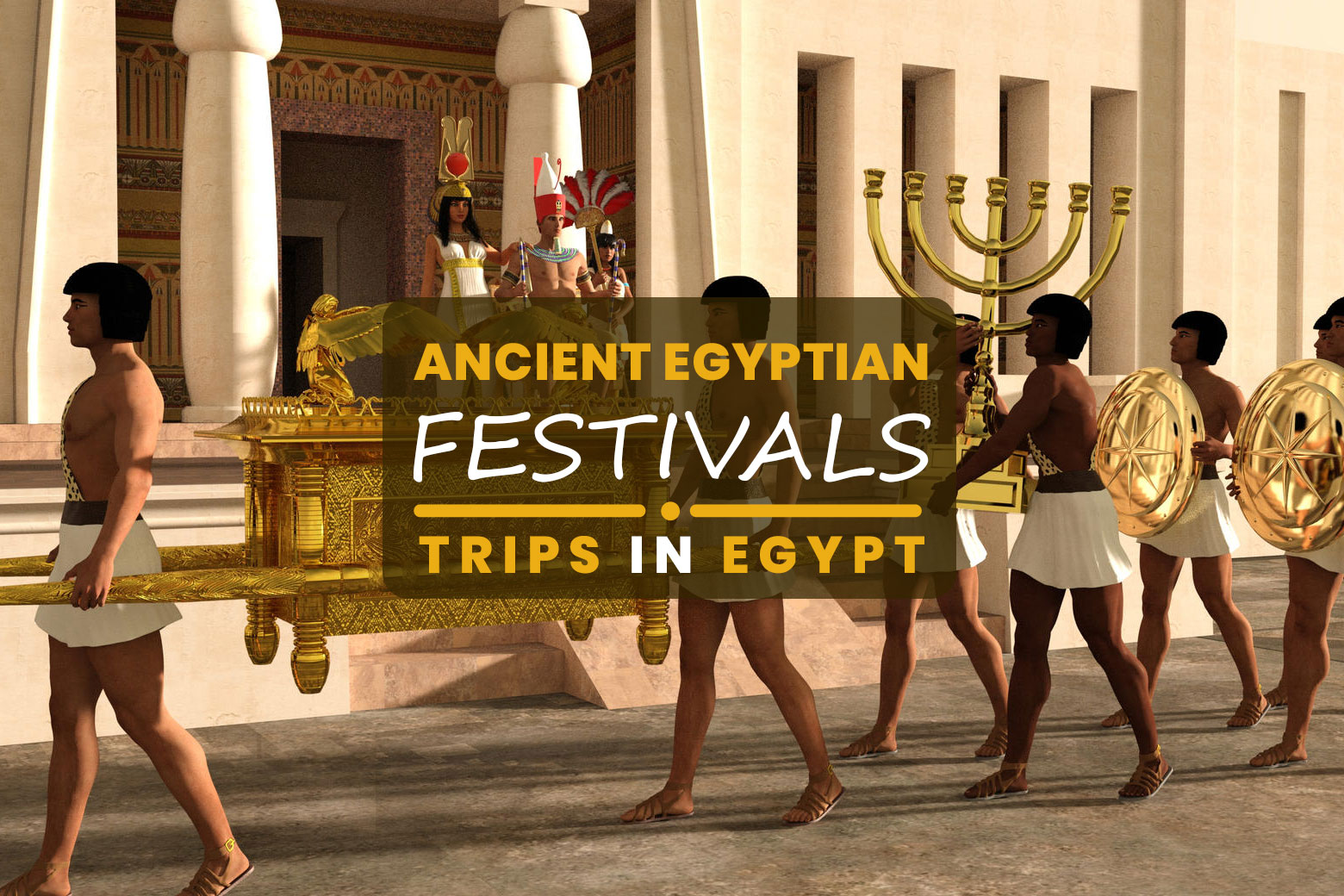
Ancient Egyptian Festivals & Celebrations
Ancient Egypt was a land of festivals, which were celebrated to honor the ancient Egyptian Gods and Goddesses through festivals by reciting hymns praising Gods and also celebrating the rise of the Nile River. The ancient Egyptian festivals were typically marked with music, feasting, drinking, and dancing, during these festivals, people would also pray for a good harvest and bountiful crops, also men and women would exchange gifts and dress up in the costumes of the festival.
Ancient Egyptian had many festivals and holidays to celebrate such as the Wepet-Renpet festival, Wag Festival, Tekh Festival, Hathor Festival, and many other festivals that we will know about in our article to ensure that ancient Egyptian festivals were a time for celebration and joy. These are just a few of the many ancient Egyptian festivals and celebrations that have been celebrated throughout different centuries
Our article will provide you with enough information to know more about the Ancient Egyptian festivals, the way they were celebrated, and the occasion of each festival.

The Nature of Ancient Egyptian Festivals
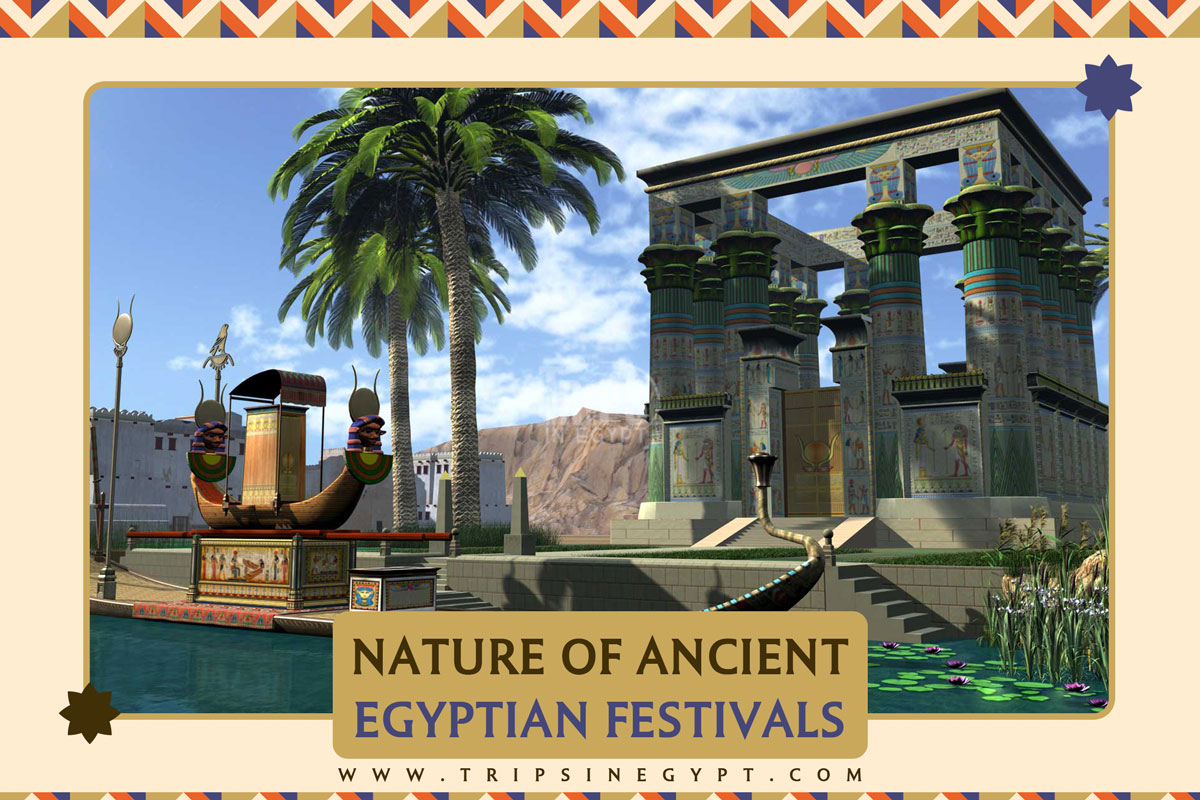
The communal gathering took place in Ancient Egypt for one of the greatest purposes "Worship", and there were many of these festivals throughout the year. The main purpose of such Ancient festivals is to allow the ancient Egyptians to witness the greatness of the Gods and Goddesses with their eyes during their moving to a certain destination and from one place to another.

Religious Practice in Ancient Egypt
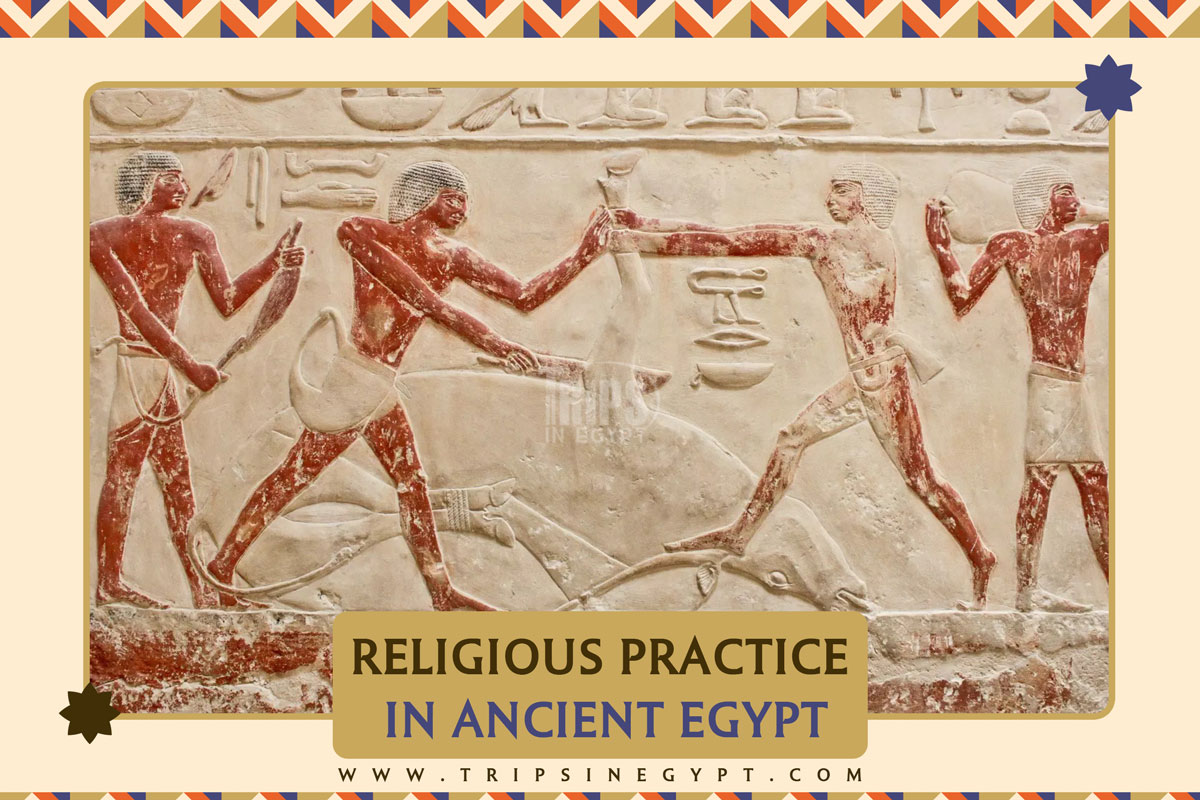
There were no religious services in Ancient Egypt like in the present time, as the only persons who could serve Gods were the priest. The Job of the priests is to administer the daily needs of God and recite hymns for the souls of the descended. The ancient Egyptians believed that the soul of Gods and Goddess housed in the inner of the temple of God. The Priest was the only person who serve the Gods until the appearance of the wife of the God "Amun" in the middle kingdom of Egypt (2040-1782 BC), this Goddess assisted in caring for the statue of Karnak at Thebes.

List of Ancient Egyptian Festivals
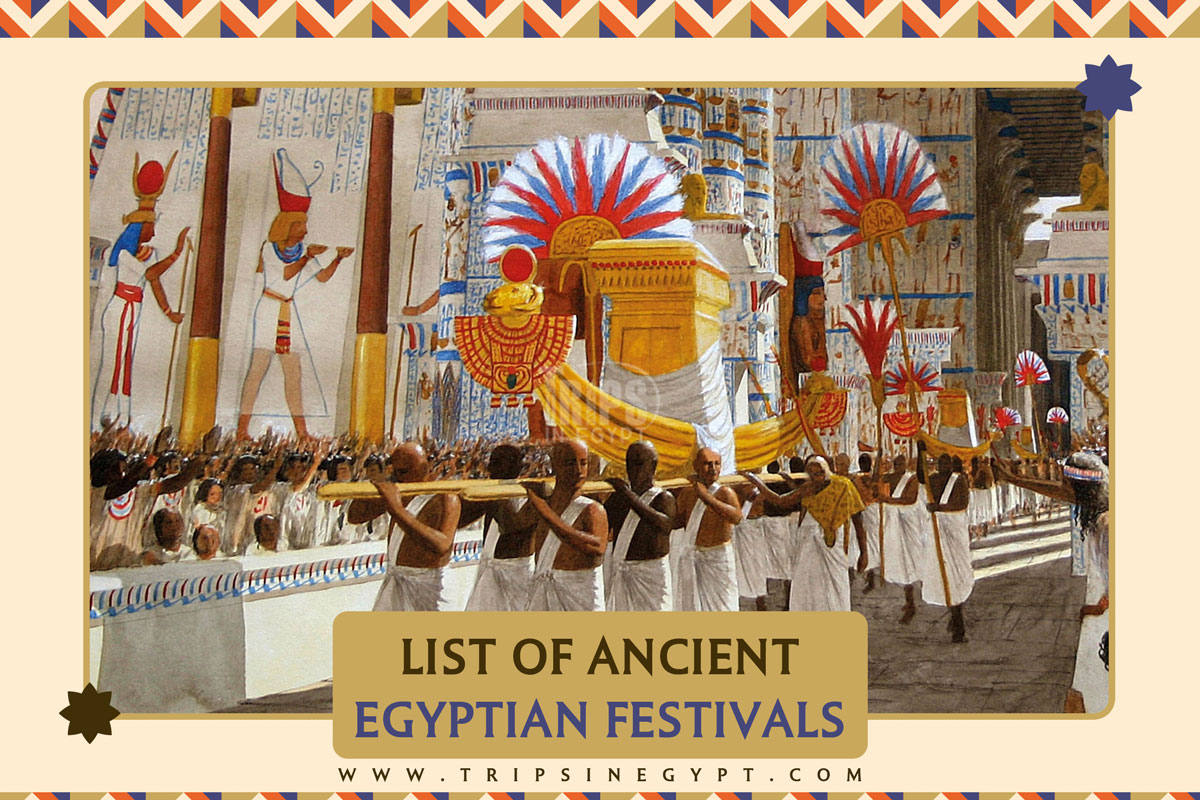
Ancient Egyptians divided the festivals into seven sections according to the occasions of each festival. The number of periodic holidays was about (282), the number of important festivals was (79), and the number of public holidays numbers (169), in addition, to one night every year to celebrate the birth of God "Thoth".
Here is a list of the ancient Egyptian festivals:
- The name of the feast.
- The Nayrouze.
- Eve Wag.
- Wag Festival.
- Anniversary of my conversion.
- Yed Akh.
- Harvests.
- Osiris Parade.
- Rights Advocacy Day.
- Day of Peace.
- Day of Prayer.
- Mekhet Festival.
- Weavers’ Day (Nate)
- Ancient Egyptian New Year.
- Acquitted Day the Eye Horus.
- Pot of the feast of Neith.
- Perpendicular sun.
- Ramses’ birthday)
- White Crown Day.
- Opt for openness.
- Khnum Festival.
- Oupet Parade.
- Unification of the two lands.
- Feast of Monthu.
- Feast of Satis and Anoukis.
- Earth Day.
- Only festival.
- Amon protector of the weak.
- Judicial authority.
- The day of the court’s decision.
- The king’s seat on the throne.
- African weapons.
- Osiris tree.
- Prosecution Day.
- Soker Festival.
- Lift a column even.
- Min Festival.
- Happy Day.
- Ykaku Festival.
- Hathor Festival.
- Wadjet Naval Parade.
- Bastet Naval Parade.
- The name of the festival.
- Willow elevator.
- Feast of Sechat.
- Death Parade.
- Anubis Naval Parade.
- Horus to Ma’aa Ptah
- Sun is perpendicular to the face of Ramses II.
- Holidays in the sun.
- Ptah Festival.
- Amenhotep Festival.
- Horus to Buto.
- The conclusion of Amenhotep’s work.
- Hathor, Bastet.
- Bastet in her boat.
- Sham El-Nessim.
- Celebration of Ra.
- Wheat Day.
- Horus fabric.
- Yield Festival.
- Feast of Horus.
- Anubis Day.
- Min Festival.
- Celebration of Hathor.
- Festival of the Valley.
- Point Night.
- Purity Day.
- Feast of Merit Amon.
- Horus hosts.
- Opening of the year.
- The return of Senoohi.
- Birthday of Hathor.
- Pamper Horus.
- Feast of All Lords.
- Abib Feast.
- Azuir Generator.
- Muttad Time.
- Generator Six.
- Isis Generator.
- Neftis Generator.
- A generator that will be transformed.

A Brief Explanation of the Important Date in Ancient Egypt
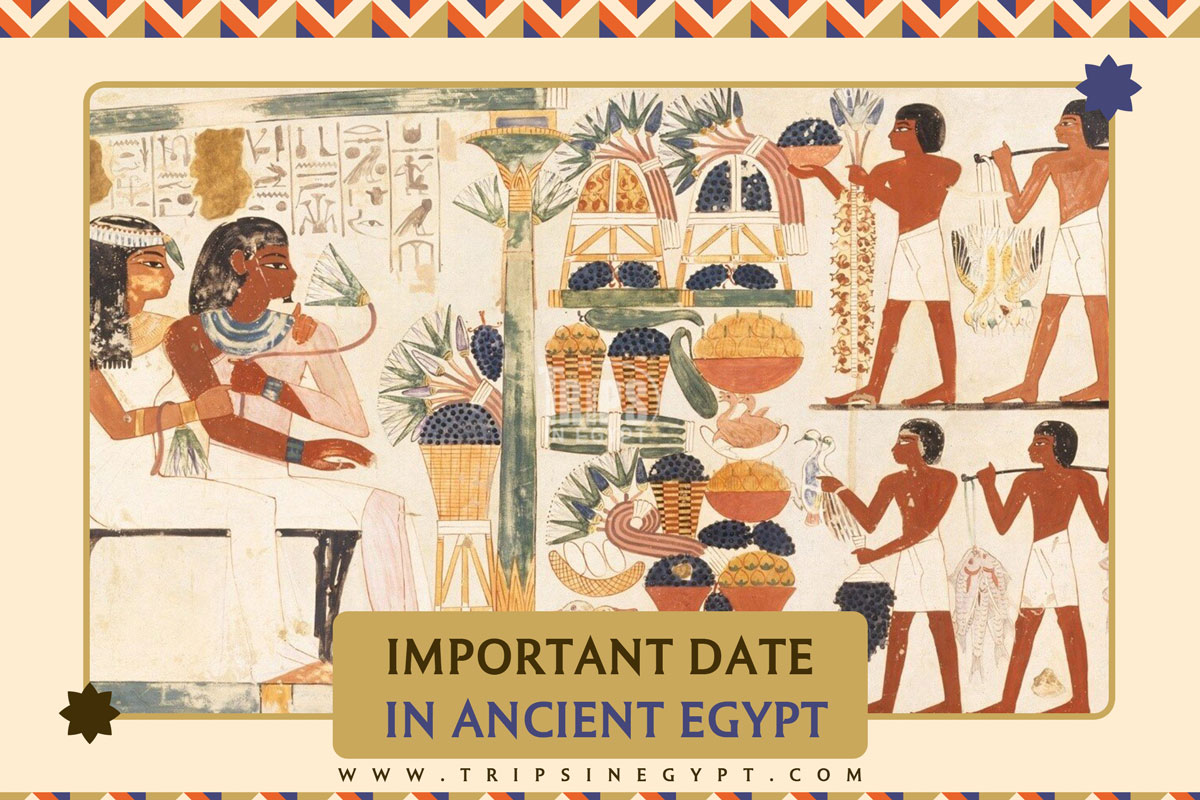
The First Month: 1st Month Of Flood
| Day 1 | Ancient Egyptian New Year – the birthday of Ra-Horakhty (The God of the Sun) |
| Day 15 | Offerings to Hapy andAmunto secure a good flood. |
| Day 17 | The eve of the Wag festival. |
| Day 18 | Wag festival. |
| Day 19 | Wag and Thoth festival (At the temple of Ramses III at Madient Habu. |
| Day 20 | Tekh (drunkenness) |
| Day 22 | Great Procession of God Osiris. |
The Second Month: 2nd Month Of Flood
| Day 15 | 11-day festivities for Amun in Luxor at Elephantine. |
| Day 19 | The great for Ramses III at Madinet Habu, and for Amun in Luxor. |
| Day 18 | Festival of God “Khnum” at Elephantine. |
| Day 27 | Festival of Mont. |
| Day 28 | festival of Satet and Anuqet |
The Third Month: 3rd Month Of Flood
| Day 9 | Festival for Amun. |
| Day 30 | Elephantine festival of Anuqet. |
The Fourth Month: 4th Month Of Flood
| Day 1 | Festival for Hathor. |
| Day 18 | Festival of the Khoiak Ceremonies. |
| Day 22 | Ploughing the Earth. |
| Day 26 | Sokar festival. |
| Day 30 | Raising the Djed-pillar. |
The Fifth Month: 1st Month Of Growth
| Day 1 | Festival of Nehebkau. |
| Day 20 | Sailing of Wadjyt. |
| Day 29 | Sailing of Bast. |
| Day 29 | Festival of Raising the Willow. |
| Day 30 | Sailing of Shesmet. |
The Sixth Month: 2nd Month Of Growth
| Day 1 | Sailing of Anubis. |
| Day 30 | Amun in the festival of raising the heaven |
The Seventh Month: 3rd Month Of Growth
| Day 1 | Festival of Ptah. |
| Day 21 | Festival of king Amenhotep. |
| Day 29 | Festival of king Amenhotep I. |
The Eighth Month: 4th Month Of Growth
| Day 4 | Festival of Bast. |
| Day 5 | The appearance of Bast in her boat. |
| Day 25 | Harvest offering to Renenutet. |
| Day 27 | Granary offering to Renenutet. |
The Ninth Month: 1st Month Of Low Water
| Day 1 | Festival of Renenutet. |
| Day 10 | Adoration of Anubis. |
| Day 11 | Festival of Min, which is a 4-day festival. |
The Tenth Month: 2nd Month Of Low Water
| This is the greatest festival of the Theban necropolis. |
The Eleventh Month: 3rd Month Of Low Water
| Day 15 | Offerings to Amun and Hapy. |
| Day 30 | Eve of the Hathor festival at Thebes |
The Twelfth Month: 4th Month Of Low Water
| Day 1-2 | The occasion is not specified. |
| Day 2 | Ipip festival. |
| Day 24 | Festival of Ptah. |
| Day 30 | Eve of the start of the year. |
The Five Days Over the Year Were Added to the 12 Months
| Day 1 | The birthday of Osiris. |
| Day 2 | The birthday of Horus. |
| Day 3 | The birthday of Seth. |
| Day 4 | The birthday of Isis. |
| Day 5 | The birthday of Nephthys. |

The Most Important Ancient Egyptian Festivals
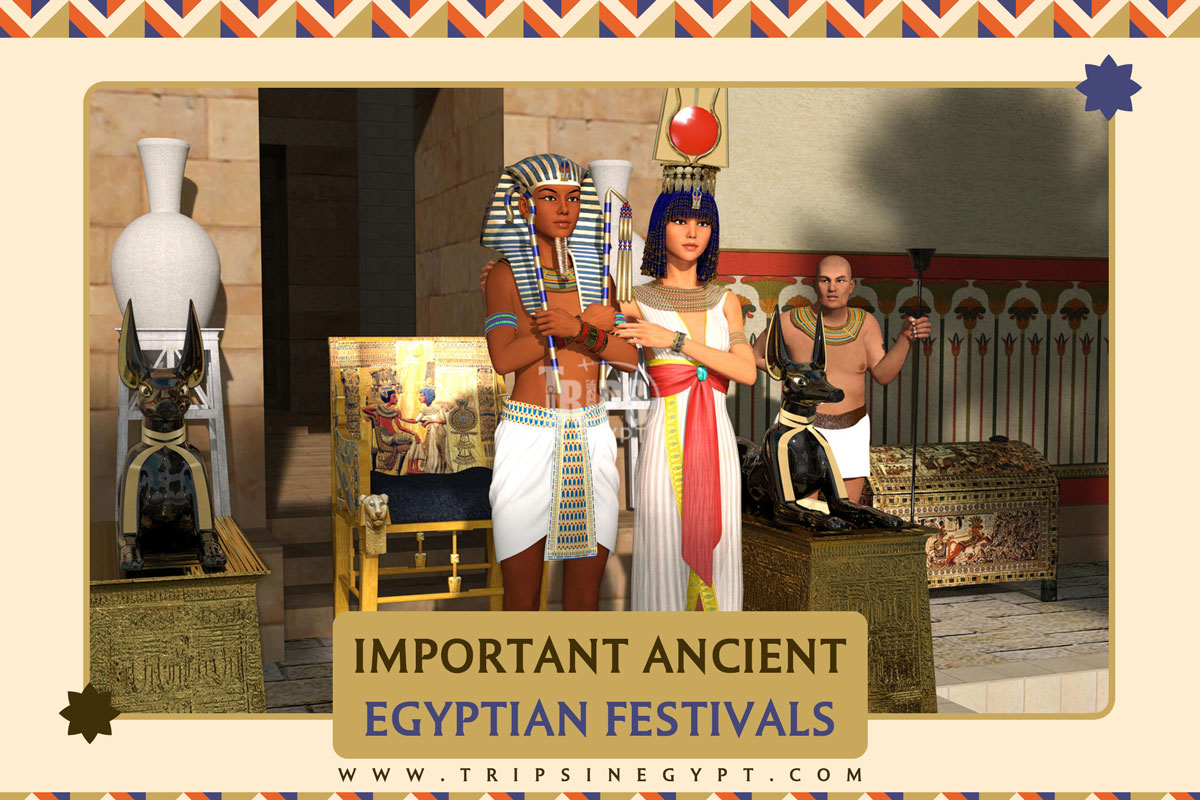
The Ancient Egyptian civilization had a rich tradition of festivals that were celebrated throughout the year. The ancient Egyptian celebration was an integral part of their religious and cultural life. Here are some of the different types of festivals that were celebrated in Ancient Egypt:
- Wag Festival
This festival was dedicated to honoring the souls of the deceased through their journey to the afterlife, and also for the death of God "Osiris". This festival took place in late August and it is one of the oldest festivals that Ancient Egyptian celebrated. During this great festival, the Egyptians made small boats of paper and set these boats towards the west "Refereeing to the Death" as they buried the deceased in the west of Egypt where are the Giza pyramids today. The main purpose of the Wag Festival is to focus on the rebirth and death of "Osiris" and recite hymns for souls to find their way to good judgment.
- Tekh Festival or the Feast of Drunkenness
This festival was dedicated to the Goddess "Hathor" (The Lady of Drunkenness) after she saved the people from destruction by beer. The legends said that God "Ra" wanted to teach the humans a lesson so he sent the Goddess "Sekhmet" to destroy them, then he ordered a large bowl of beer to be brought by "Sekhmet", and she drank it, and fall asleep to make her stop in destroying the humanity. When the Goddess woke up, she became more merciful, kind, and gentle. Ancient Egyptian celebrated this occasion as they sing, dance, and drink beer until the morning to celebrate their survival.
- Opet Festival
The Opet festival is one of the most important festivals in ancient Egyptian festivals, which the Egyptian king rejuvenated by "Amun" in Thebes. The Egyptians celebrated Opet Festival during the middle kingdom and it flourished in the New Kingdom where the twentieth dynasty is. The priests wash and dress up the statue of the God which is the soul of him housed this statue, then they carry it to Luxor, where the Ancient Egyptians were willing to see their God and greeted by thousands of people. When the statue arrives in Luxor, the king enters the temple in presence of God "Amun" and emerges forgiven of his sins.
The Opet Festival supplied the Ancient Egyptians with food, drinks, sweets, distributing bread, and beer. The Egyptians wait their turn to ask God "Amun" a question in a line, and the priests answer these questions or indicate a positive or negative response.
- Nehebkau Festival
God Nehebkau is associated with "Ka" which means "soul" and "khat" which means "the body" at birth. The Ancient Egyptians celebrated the resurrection of God "Osiris" and his rebirth as well. Nehabkau is similar to the Festival of New Year, and the Festival of Wepet-Renpet.
- Hathor Festival
This festival was held every year at the temple of Dendara, as it is the site of the cult of Goddess "Hathor". Ancient Egyptian celebrated this day for the birth of the Goddess and her many blessings. The cult of the Goddess was so much popular in the old kingdom as the celebration of Neith. The Hathor festival was well-attended wherever it was held. They celebrated it by drinking alcohol while singing and dancing in honor of the Goddess.
- Min Festival
"Min" was the God of virility, reproduction, and fertility in the Presynaptic period in Ancient Egypt (6000-3150 BC). God "Min" was represented as a man standing and holding a flail. The festival of "Min" is the best festival in Early Dynasty and afterward
- Wadi Festival
The Wadi festival is similar to the Day of the Dead in Mexico, and the Qingming festival in China. The Wadi Festival is a beautiful way to celebrate the Deceased’s souls and at the same time, they honor God "Amun". The statuses of God "Amun" were taken to visit the mortuary temples across the River Nile. The Egyptians visited their beloved deceased and brought food, drinks, offerings, and flowers for them.
- Sed Festival
In this celebration, they honor the king. Sed Festival was held every thirty years of the region of the King to prove his power, strength, and physically fit for the rule of Egyptians. The king should run in a large space such as the Giza Pyramids Complex to prove his strength. In the later era, he should fire arrows to prove also that he can bring other nations under the role of Egypt.

A Short Brief of the Different Types of Ancient Egyptian Festivals
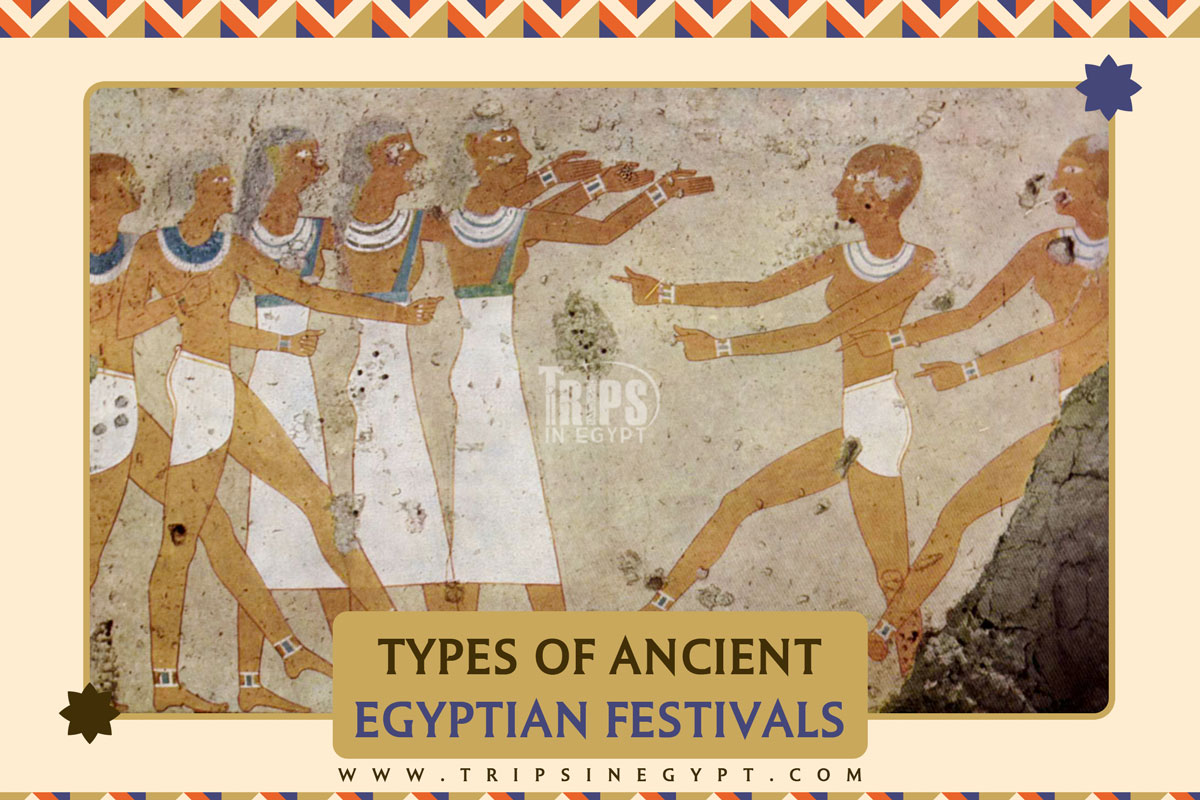
- Agricultural Festivals: These kinds of festivals were related to the agricultural seasons and marked an important impact on the life of the Ancient Egyptians. The most important agricultural festival was the festival of Wepet Renpet, which marked the beginning of the Ancient Egyptian New Year.
- Religious Festivals: These kinds of festivals were dedicated to the worship of Ancient Gods and Goddesses. The most important religious festival was the Opet Festival, which celebrated the union of the God "Amun" and his wife Goddess "Mut".
- Royal Festivals: These kinds of festivals were held to mark important occasions in the life of the Egyptian Pharaoh, such as his coronation or the birth of his heir. The Sed Festival was one of the most famous festivals that celebrated the renewal of the Pharaoh's power after 30 years of his reign.
- Funerary Festivals: These kinds of festivals were held to honor the dead and ensure their safe passage through their journey into the afterlife. The most important funerary festival was the Osiris Festival, which commemorated the death and resurrection of the God "Osiris"
In summary, Ancient Egyptian festivals played a significant role in ancient Egyptian culture, providing an opportunity for people to come together, celebrate, and connect with their Gods and Goddesses.

Great Facts about the Ancient Egyptian Festivals
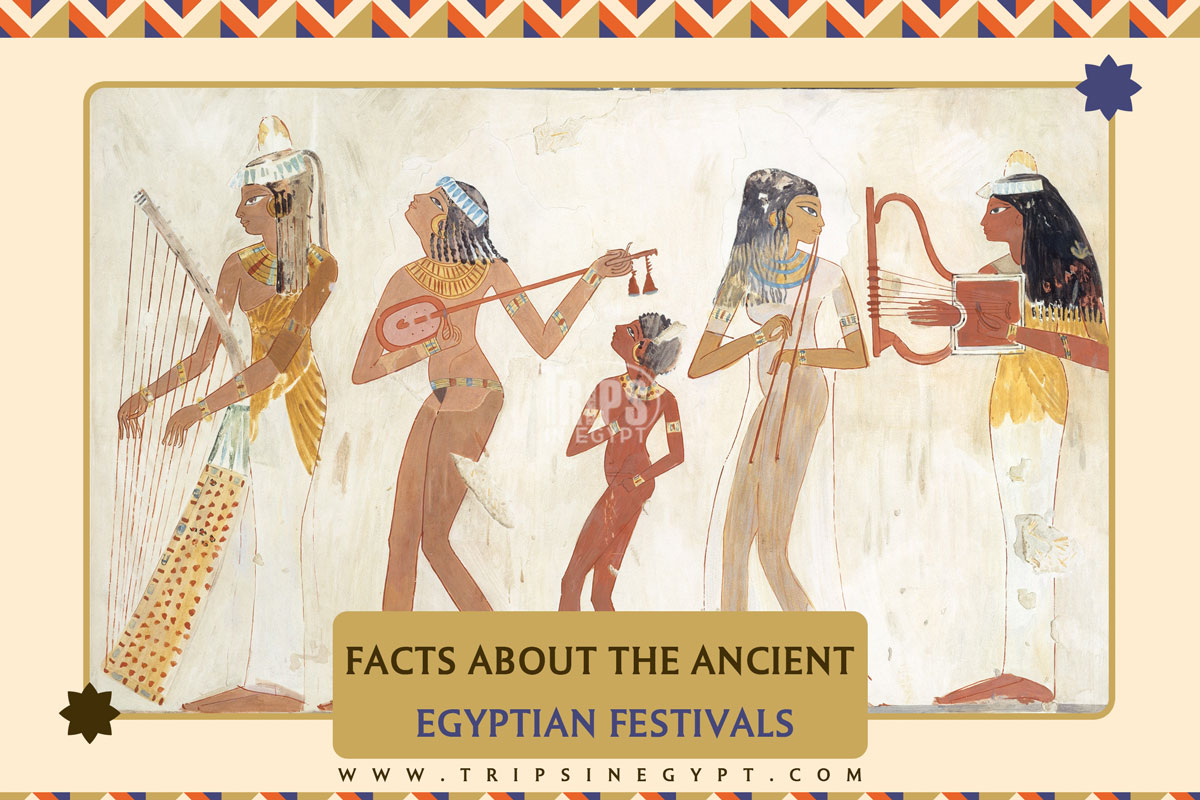
- When Ancient Egyptian gatherings, this occasion is called a festival.
- The purpose of sitting festivals is to thank the Gods and Goddess as they gave those gifts and blessings.
- The job of the Priests is to talk to the Gods, and Goddesses and answer the question of the Egyptian people.
- Beer was an important drink in celebrating the festivals, as they drink beer while dancing, singing, and also play sacred drums.
- Wag festival was an important festival as they celebrated it for the soul of the deceased.
- The Opet festival was important as it gives the king power, and strength, and renewed him from the year prior.
- The Wadi festival is an exciting celebration as they believed that the dead celebrate with them.
- The Wepet-Renpet Festival was for celebrating the death of God "Osiris
- Wag festival was for celebrating who went to the afterlife.
- The Ancient Egyptian people liked to share in celebrating all these festivals to show love to their Gods and Goddesses.
- The Kings would pay for the most of festivals.
- The Feast of Thoth was held to honor the God of wisdom and knowledge in Ancient Egypt.
- The Feast of Wag was held in the first month of the flood season and was marked by rituals and offerings to the Gods.
- The festival was also a time for men to court women and for women to find husbands.

Conclusion
Ancient Egyptian festivals were an integral part of ancient Egyptian traditions and they played a significant role in their religious and cultural life, from agricultural festivals that marked the beginning and end of seasons, to religious festivals dedicated to the worship of Gods and Goddesses, and also funerary festivals that honored the dead. Ancient Egyptian festivals in general provided an opportunity for the Egyptian people to come together, celebrate, sing, dance, recite hymns, and connect with their Gods and Goddesses.
These festivals not only brought people together and had only a strong connection among them but also strengthened their sense of community and identity. The richness of these Ancient festival traditions is a testament to the depth of Ancient Egyptian culture and the enduring legacy of this remarkable civilization.
Trips In Egypt is ready to make your tour more relaxing, energizing, and exciting! Don't miss out on these enjoyable Egypt tour packages to start an unforgettable adventure in the Pyramids, and Temples, it is your choice now to choose whether you will experience these breathtaking attractions overland or by our Nile Cruises. Make sure that it is gonna be awesome! Contact our operation department now as they are available 24/7 for making your dream to Egypt come true!
Great vacation for 4 days in Cairo Egypt accompanied by an e...
Duration
4 Days / 3 Nights
Availability
Everyday
An Incredible 5 days Cairo & Alexandria tour package to expl...
Duration
5 Days / 4 Nights
Availability
Everyday
Explore Egypt's ancient wonders on a 6 days vacation to Cair...
Duration
6 Days / 5 Nights
Availability
Everyday
Breathtaking 7 days Cairo, Luxor & Hurghada holiday to explo...
Duration
7 Days / 6 Nights
Availability
Everyday
FAQ
What Should I Wear While Being in Egypt?
You should wear whatever you want. It is advised to wear something light from cotton or linen, comfortable and put on sunblock during your time in Egypt in the summer and wear comfortable footwear like a closed-toe shoe to sustain the sandy terrain.
What to Pack for Your Egypt Tour?
You should bring a brimmed hat and sunglasses if you not used to the Egyptian sun &pack everything you could ever need and put in a small bag so you could move easily between your destinations.
Are All Nile Cruises Available at Any Time?
Yes, it is available all years. as the Nile from Aswan to Luxor takes three to four days of sailing on Monday, Wednesday and Friday for the total cost of 600$ and the Nile cruise from Luxor to Aswan take four to five days in Saturday, Monday and Thursday for the coast of 650$.
Why book Trips in Egypt?
We have experience in vacation planning for more than 10 years & our staff consists of the most professional operators, guides and drivers who dedicate all of their time & effort create the perfect vacation. All of our tours are customized by Travel, Financial & Time advisors to fit your every possible need during your time in egypt. we always keep in mind that your safety & comfort are our main priority until you return home.
Is it safe to travel to Egypt?
Yes, it is absolutely safe to travel to egypt, You will feel secure in Egypt as the current atmosphere of the country is very peaceful after the government took powerful measures like restructuring the entire tourist police to include all the important and tourist attractions in Egypt and construct an entire environment dedicated for ensuring the lives of all tourists.
What are Egypt's Visa Requirements?
They are very simples, If you want to apply for a Visa On Arrival that lasts for 30 days then you should be one of the eligible countries(check the link), have a valid passport with at least 6 months remaining and pay 25$ USD entry fee in cash. As for the E-Visa for 30 days, you should have a valid passport for at least 8 months, complete the online application, pay the e-visa fee then print the e-visa to later be presented to the airport border guard. You could be one of the countries eligible for a free visa for 90 days.
What is the Weather is Like?
The temperature of Egypt ranges from 37c to 14 c, Summer in Egypt is somehow hot and winter is cool and mild but sometimes it becomes cold at night. The average of low temperatures vary from 9.5 ¡ÆC in the wintertime to 23 ¡ÆC in the summertime and average high temperatures vary from 17 ¡ÆC in the wintertime to 32 ¡ÆC in the summertime while the temperature is moderate all along the coasts.
What is the Best Time of Visit Egypt?
It is known the best time to travel to Egypt is in the winter from September to April as the climate becomes a bit tropical, a warm atmosphere with a winter breeze. You will also be notified a week before your trip if the weather is unsafe or if any changes have been made.
Should I Give Tips in Egypt?
It is totally up to you, but if you choose to you can tip the servers at your restaurant 5-10% by handing it to them directly and 5 Egyptian Pounds as a general tip of anyone.
Can I Enter the Pyramids?
Yes, you can enter the pyramids for the small fee of 20$.
How to Enjoy Egypt During Ramadan?
Ramadan is a special time of year for Muslims that should be celebrated by non-Muslims and feel the essence of the Islamic culture. You can fast with the Muslim or just observe but you are always welcome to join the celebrations and festivals.

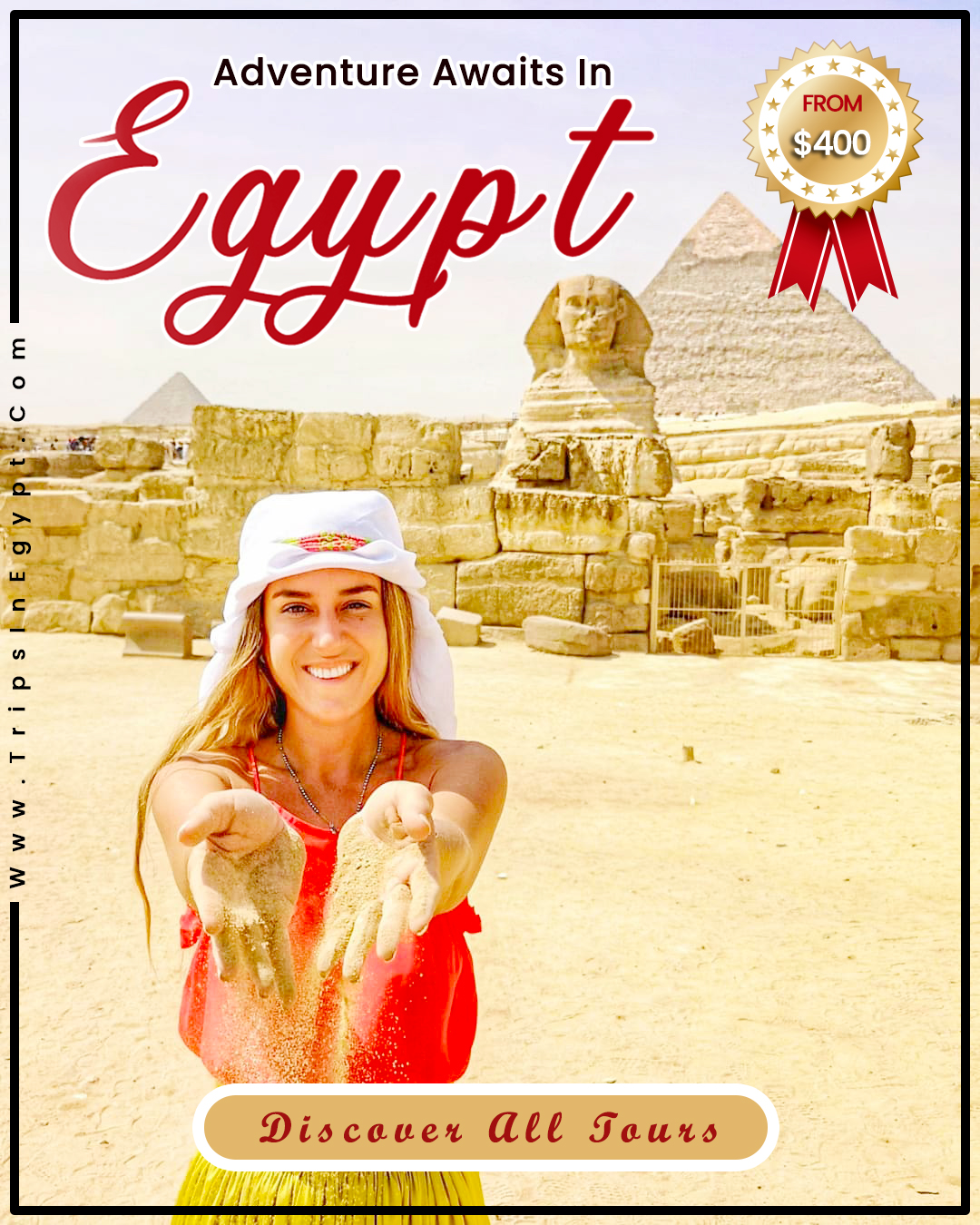
Share Your Comment